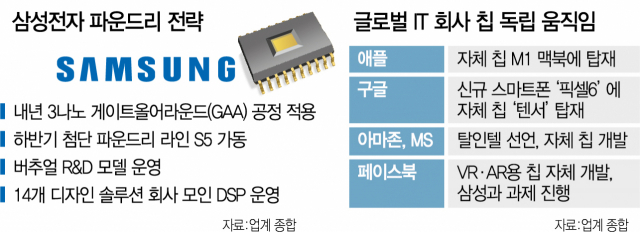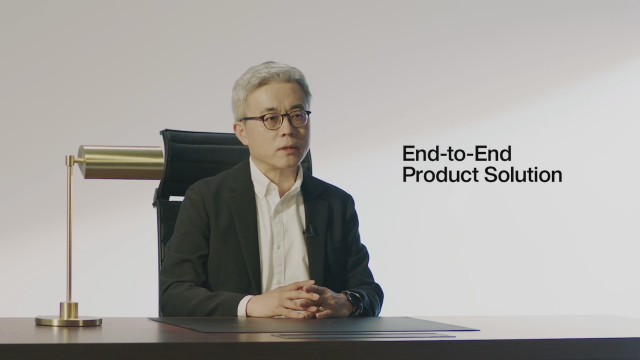Google and Facebook Declares Chip Independence...Samsung Foundry Opportunities
Diversification of electronic devices and enhancement of performance
Design custom chips and trust them to produce them.
Support Samsung's 'Virtual R&D' entire course
Strengthen cooperation with IT companies by increasing high-tech processes

Global IT dinosaurs such as Google and Facebook are developing their own semiconductors. Analysts say this phenomenon is a boon to Samsung Electronics. It is said that this is a great opportunity for Samsung Electronics, which is working on 'consignment production of semiconductors' based on its vision of number one in system semiconductors. Samsung Electronics is planning to increase cooperation with IT companies through 'Virtual R&D' model and high-tech process that is less than 5nm.
According to industries on the 4th, Google, the world's largest IT company, has installed its own application processor (AP) called 'Tensor' in its new smartphone 'Pixel 6'. AP is a chip that acts as a brain that is responsible for various operations within a smartphone. Although Google has been using Qualcomm's AP for its products, it has claimed to be a chip-independent vanguard this time without using established APs.
In addition to Google, global IT dinosaurs are developing their own chips like a trend. Apple developed its own chip M1 and installed it on its MacBook in November last year. Tesla also put two self-developed fully autonomous driving (FSD) chips inside an electric car. Amazon and Microsoft also decided to design their own chips that are used in electronic devices instead of Intel chips.
The reason why independence of chips is spreading like a trend is because 'tailored chips' that are perfect for each company are needed due to diversification of electronic devices and advanced performance. This is why IT companies are working hard to design chips while fostering next-generation industries such as virtual reality (VR), augmented reality (VR), and autonomous driving.
However, they only design chips and do not have foundry lines that produce them. It is going to entrust production to major foundry businesses such as Samsung Electronics and TSMC.
Therefore, industries predict that the growing trend of large IT companies' chip independence will be a good opportunity for Samsung's foundry business, which is seeking the world's No. 1 market share. Already, Samsung Electronics is producing chips for world-class IT companies such as Facebook, Tesla, Cisco, Baidu, China, and Sony, Japan, or carrying out tasks to develop chips for them. As orders from individual customers increase, not only sales but also mass-production cases can be accumulated, which can secure trust from customers in the future.
In addition, Samsung Electronics supports a model called 'Virtual R&D' to respond to each IT company' Virtual R&D is a development model with a concept that closely supports all processes of production of chips from chip design to packaging after production. It is also planning to work with 14 design solution partners (DSP) such as AD Technology, CoAsia, GAONCHIPS, Semi Five, and Hanatec to maximize their capability to support design.
Choi Si-young, president of Samsung Electronics, is explaining 'Virtual R&D' model that supports from chip design to production./Picture=VLSI Forum 2021 VLSI Forum Presentation Vide
In the case of processes, it is planning to respond to cutting-edge chip design by applying the latest 3nano Gate Round (GAA)-based 'MBCFET' technology to mass-produce next year. Choi Si-young, president of Samsung Electronics' Foundry Business Department, said in a recent forum, "We will implement flexible technologies that allow customers to expand their choice of processes from initial development to production stages."
Some also predict that the recent resumption of Intel's foundry business will have a negative impact on Samsung, but others say that if the company persuades its customers with superior price competitiveness compared to Intel, it can take solid market influence.
However, some say that in order to realize this, various nodes and performance must be secured in addition to high-tech processes. "We need to actively secure middle end processes that are more than 28nm that can respond to various customers as well as improve processes that are less than 7nm." said a representative for a South Korean fabless company.
By Ministry of Industry reporter Kang Hae-ryeong hr@sedaily.com
http://www.sedaily.com/NewsView/22Q246AVCJ

